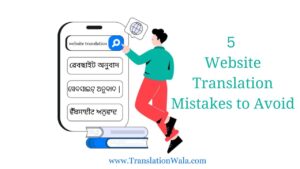The practice of customizing a website to a given area or culture is known as website localization. It entails translating the content of the website into the local language, but it also extends beyond that. Localization also entails changing the design, images, and overall tone and style of the website to make it more relevant and appealing to the local audience.
Why is Website Localization Important?
Localization of a website is vital since it allows businesses to reach a larger audience, improve sales, and develop closer relationships with their customers.
Here are some of the specific benefits of website localization:
- Increased reach: You may make your website accessible to people who speak different languages and live in diverse cultures by localizing it. This can assist you in reaching a larger audience and growing your business.
- Increased sales: According to studies, consumers are more likely to buy from websites that are in their native language. You may enhance your chances of earning sales to customers all over the world by localizing your website.
- Stronger customer relationships: When you localize your website, you demonstrate to your clients that you are concerned about their needs and devoted to providing them with a great experience. This can help you strengthen your consumer interactions and enhance customer loyalty.
Also Read: What Is Interpretation And Types Of Interpretation?

How to Localize Your Website
There are a number of things that you can do to localize your website, including:
- Translate your website content into the local language – This is the most crucial step in the process of localizing your website. To ensure that your translations are correct and culturally suitable, engage a professional translator.
- Adapt your website’s design and imagery – Keep the local culture and aesthetic preferences in mind while developing your website. Use imagery that is relevant to the local audience and avoid pictures that could be interpreted as offensive or disrespectful.
- Adapt your website’s tone and style – Your website’s tone and layout should be appropriate for the local culture. For example, in some cultures, being excessively direct or pushy is considered impolite. You should employ a more indirect and polite tone in these cultures.
- Use local keywords – Use local keywords while optimizing your website for search engines. This will help your website rank higher in search results for customers looking for products or services in their native language.
- Make it easy for visitors to switch languages -Make it simple for users to switch languages if your website is offered in various languages. This is accomplished by including a language picker in your website’s header or footer.
Also Read: What is Transcription and Types of Transcription?

Tips for Successful Website Localization
Here are a few tips for successful website localization:
- Do your research – Before you begin localizing your website, you should conduct some research on the local culture and market. This will assist you understand your target audience’s wants and preferences.
- Work with a professional – It is critical to collaborate with a skilled translator and localization specialist when localizing your website. This will assist you in ensuring that your website is accurately and culturally appropriately localized.
- Be consistent – When localizing your website, it is critical to maintain consistency in tone, style, and vocabulary. This will aid in providing a consistent and professional experience for your visitors.
- Test your website – It is critical to test your website after it has been localized to ensure that everything is running properly. This includes testing the website translation, design, and overall functionality.
Conclusion
Website localization is a critical investment for any company seeking to reach a worldwide audience. You may make your website accessible to people who speak different languages and live in diverse cultures by localizing it. This can help you expand your reach, raise your sales, and strengthen your relationships with your customers.



